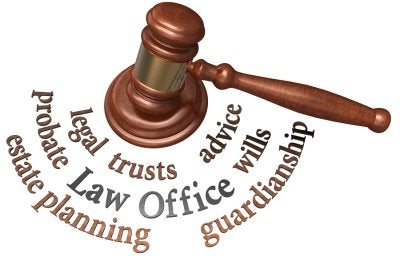-
Probate in Texas: Understanding the Process
Probate is the process of recognizing a death and validating a will for the purpose of administering the decedent’s estate. A decedent’s estate will go through probate regardless of whether an individual had a legal will or died intestate (without a will). After a loved one passes, hiring a probate lawyer can be immensely helpful. A probate attorney in The Woodlands can ensure that the requirements of the Texas Probate Code are met and that probate proceeds as efficiently as possible. The lawyer can also help the family understand what to expect from each step of the probate process.

Waiting Period
The first step your lawyer will take in most probate cases is to file the application and the original of the will at the courthouse. Then, there is a mandatory waiting period, which begins once the application is filed.Probate Hearing
After the waiting period, the court may schedule a probate hearing or your attorney may schedule it. Probate hearings are usually held in the courtroom, however, sometimes they take place in the judge’s office. At the probate hearing, the judge will recognize the death of the decedent, determine that the court has jurisdiction, determine that the executor is qualified, and recognize the validity of the will . The lawyer states certain facts about the decedent to a witness, who is then required to confirm the truth of the facts. Thereafter, the judge may issue an order that admits the will to probate.Estate Administration
After the probate hearing, the executor begins administering the estate. He or she must sign an Oath, which is a legal document verifying the executor’s intent to fulfill all necessary duties required by law and the will. Next, the executor usually orders Letters Testamentary. These “Letters” provide the executor with the authority necessary to administer the estate, such as the power to close bank accounts and sell property. The executor must also publicize information about the estate to potential creditors, provide each beneficiary with a copy of the will, and file various documents with the court. These documents typically include an inventory of probate assets, the decedent’s final income tax return, and a document that confirms the publication of notice to the creditors. Finally, the executor will resolve debts and distribute assets. -
Do You Need to Set Up a Trust?
If you wish to make financial arrangements for your children, grandchildren, or other heirs, it’s a good idea to speak with a lawyer about estate planning , including the possibility of establishing a trust. An attorney in Conroe, TX, can help you explore the various aspects of a trust and how to structure your trust to accomplish your goals. For example, you could use the trust to leave a certain amount of money to your child, which could be distributed in set amounts at certain intervals. This arrangement prevents your child from spending his or her inheritance all at once. Or, you can place conditions on your child’s inheritance. For example, you can have your lawyer set up the trust to distribute small amounts of money over time and to only allow your child to receive the rest after he or she graduates from college.
Another reason why you might ask your attorney to establish a trust is for tax advantages. Life insurance policies provide tax-free benefits to your beneficiaries. However, the death benefit amount may be added back into the estate, which may make it [the estate] subject to federal estate taxes. Establishing an irrevocable life insurance trust protects the full death benefit for your beneficiaries.

-
Top Issues to Discuss with Your Texas Divorce Attorney
Going through a divorce can feel overwhelming at times. However, you may find some peace of mind knowing that your divorce lawyer serving Spring, TX, will handle the legal matters for you, while you focus on moving forward with your life. To help you stay organized, it’s always wise to jot down a list of questions and concerns you have for your divorce lawyer . Some common family law issues are child custody, visitation, support, and property division.

Child Custody
If the marriage produced a child, the child’s best interests should be the top priority for both parties. Even if your divorce is contentious, it’s important to realize that your child doesn’t share your feelings toward your soon-to-be ex-spouse and that your child needs both parents in his or her life. Your divorce lawyer can help you negotiate a child custody arrangement that preserves both parents’ relationships with the child.Visitation
Even when parents share joint custody, the child will generally reside with one parent more than the other, solely for practical purposes. When you meet with your family lawyer, discuss what you expect from the visitation schedule. Consider who might have the child for holidays, school vacations, and weekends. Additionally, consider whether the visitation schedule allows the child sufficient time for school projects, extracurricular activities, and social events.Child Support
Non-custodial parents will be required to pay child support. Generally, in Texas, a non-custodial parent of one child must pay 20 percent of his or her net monthly income. The percentage of net income set aside for child support increases when there are multiple children to support. Consider asking your child custody lawyer how to obtain and enforce a child support order if you are the custodial parent.Property Division
The division of assets and liabilities is another significant issue for divorcing couples. When you meet with your divorce lawyer, bring along a list of your marital assets and debts. Let your lawyer know which assets are most important to you and which you might be willing to let go to the other party. In Texas, community property is not necessarily divided on a 50/50 basis. Fault for the breakdown of the marriage and differences in earning potential of the spouses are factors that a judge might consider when dividing property and liability. -
Top 10 Reasons for Divorce in Texas [INFOGRAPHIC]
With more than half of marriages each year ending in divorce, it’s no surprise that there are a long list of reasons couples split. Most of the actual reasons couples divorce are emotional ones, including trust issues, jealousy, and disagreements over religious and cultural issues. However, when you go to a divorce lawyer to file your case, one of the first things he or she will do is try to match your reason for splitting with one of the seven legal grounds for divorce in Texas. That is just one of the reasons why it is so important to let a divorce lawyer handle your split as you negotiate family law issues like spousal and child support. Learn more about why couples divorce in this infographic from Andrew J. Bolton, Esq. , a divorce lawyer serving The Woodlands. Choose our practice when you need a divorce or family lawyer, and please share this information to help others facing this difficult situation understand their rights.

-
Understanding the Issues in Texas Child Custody Cases
Getting divorced can be painful, but it’s sometimes necessary for the emotional well-being of all involved. Child custody arrangements are a particularly difficult aspect of divorce that millions of couples struggle with. If you’re in the midst of a divorce involving children, then you should have a skilled family law attorney in The Woodlands represent you in your divorce case. It also helps to understand the basics of family law in Texas and the factors involved with child custody.

Relationships
The relationship that the child has with each parent is an important factor to consider when determining child custody. Mothers most often get primary custody in divorce cases, but not always. Courts look at which parent has historically been the child’s primary caregiver. The child’s personal friendships may also factor into a custody decision—especially if custody with one parent means taking a child away from those friendships.Stability
Each parent’s emotional and financial stability must be considered as well. The child’s best interests are the center point of any Texas court’s custody decision, and the parent best equipped to care for the child’s needs will likely receive primary custody. For example, if one parent has a history of drug abuse or mental illness, custody will more than likely go to the other parent.Logistics
Many divorced parents share joint custody of their children. However, this may not be feasible if one parent lives in a different town or has a complicated work schedule. If it’s not possible for a divorced couple to share custody 50/50, then one parent may be given sole, or primary, custody.Visitation
Texas courts want both parents to be involved in their children’s lives, if possible. If one parent has primary physical custody, the other parent should be granted reasonable visitation rights which fit within everyone’s schedule. Divorced parents may also negotiate independently for joint legal custody, wherein both parents are involved in making decisions regarding the child’s education, religion, healthcare, and other matters. -
Testifying In Divorce Court
When a party is required to give testimony in divorce court it is usually because there’s an argument over one of two questions. The first is child custody, and the second concerns property division.
If you listen to your lawyer, you often will hear the same piece of advice given about any type of courtroom testimony. It usually goes as follows: “Answer the question given to you, and only the question, do not elaborate.” An analogy: Only a little water will clean you up nicely–too much of it and you are likely to drown. Lawyers do understand that there’s a huge temptation to give the full story in response to a single question, but the more you speak the more ammunition you may give your opponent. To summarize, why assist the opposing lawyer in looking good? Keep it short!
Second, if you have made a huge mistake in life, do not volunteer it, but simply fess-up when asked. Trust me, if you’ve screwed up royally, the opposing lawyer has a witness who will remind the Court, and everyone else, what you did. It is always easier if you are the one to do it first, not in a dramatic way, but merely as an acknowledgement of human frailty. In short, if you are seeking custody and have had a drug problem, it will hurt you, and perhaps it should. But lying about it only to have a cop get on the stand afterwards, and talk about your long rap sheet will do much worse for you than simply admitting the problem yourself.
Third, never ever say on the witness stand: “You can’t prove it!” Or perhaps, “It’s my word against his/her’s.” The translation of these words to the Judge is: “Heck yes I did it Judge! But I’m not going to tell you that here!” The result of such testimony is the same as an admission of guilt, only worse.
Finally, always adhere to this advice: If you don’t know the answer to a question, then say that you don’t know–don’t speculate or guess! This advice applies even to things that you should know! Speculation gives the opposing party a chance to show the Judge that your testimony is unreliable. For example, you are arguing over custody of your third grade daughter and the opposing lawyers asks, “who’s your child’s homeroom teacher?” If you don’t know then say it; don’t blurt out “Smith!” Yes, not knowing hurts but judges understand that lawyers’ cross-examination questions are intended to hurt. In this scenario, your own lawyer might well come back and say “Well he doesn’t know the homeroom teacher, but he knows the names of the gym teacher, principals, ARD advisors, and every physician she’s ever been to!” That’s an ideal recovery to a missed question. So the underlying lesson to be learned here is: be prepared! Proper Prior Preparation Permits Peak Performance!
-
How to Choose a Divorce Attorney
The end of a marriage can affect every part of your life. Aside from the emotional consequences of divorce, you must consider the financial ones as well. As a result, finding the right family law attorney serving The Woodlands is key for your future security and well-being. Because divorce is not an event that many people experience often in their lives, few have significant knowledge about how to choose a divorce attorney. If you are in need of a lawyer, keep these guidelines in mind during the selection process:

Evaluate Your Options
An impeding divorce can be a worrisome situation even under the best of circumstances. You may feel pressed to choose the first attorney that a friend recommends or a commercial suggests, but it is important to exercise patience until you feel wholly comfortable with a particular attorney or law office . With this in mind, you can use resources such as loved ones and media outlets to create a list of potential candidates with whom you would like to discuss your case.Set Up a Consultation
Family law experts often allow for complimentary meetings with prospective clients so that they can learn more about the case. This first appointment may be all the time you have before deciding if you want to use a particular divorce lawyer, so come to each consultation prepared with questions. You should also observe how each attorney interacts with you. Indeed, this lawyer may be a person with whom you must work with for several months or longer. Having a comfortable professional relationship is often critical for an optimal legal outcome.Give the Lawyer the Necessary Facts to Assess the Case
As you consult with each divorce lawyer, you may want to bring up specific circumstances that may impact the details of your divorce. For instance, did you sign a prenuptial agreement with your spouse? You should also tell each attorney if you have children, as the status of your current child custody and child support arrangements could affect the outcome of your divorce. Knowing that your lawyer has a background helping clients with such aspects of their divorces can better ensure that you too can experience a favorable result. In any event, when consulting with an attorney, do not withhold negative information about yourself. Rest assured, if you keep your attorney ignorant of your dirty laundry, your spouse will not keep the opposing attorney similarly in the dark. Your attorney needs to prepare a response to negative information about you – and that’s best done weeks or months in advance of a trial, versus standing in front of the judge. Disclose everything as soon as possible. -
What to Know About Divorce in Texas
In Texas, you can file for divorce on either fault or no-fault grounds, so it’s important to work with a divorce lawyer in The Woodlands who understands both processes. Filing for divorce based on fault grounds may be advantageous when it comes to dividing marital property or assigning alimony. However, filing for no-fault divorce allows you to negotiate the end of your marriage without assigning blame or fault.

Property division
Before meeting with a lawyer about your divorce claim, you need to ensure you meet the Texas residency requirement for divorce. This means that either you or your spouse must be Texas resident for at least six months prior to filing for divorce. Texas is a community property state, meaning that all income and property acquired during your marriage is considered marital property. At divorce, you and your spouse equally own the property, so division among you and your spouse is equal.Child custody
In every state, the court presumes that frequent and continuing contact with each parent following divorce is in the child’s best interests. As a result, judges support joint custody agreements whenever possible. However, depending on the circumstances of your case, a judge may allocate custody differently. If you are considering asking for primary custody, you should discuss your options with a family lawyer.Child support
Following divorce, both you and your spouse are required to financially support your child. However, the exact amount of child support depends on each of your incomes, financial resources, and time spent with the child. Sometimes, a court will assign a higher income requirement if one parent has the capacity to earn more than he or she is currently earning. A child support attorney can help you calculate your potential child support obligations following divorce.Spousal maintenance
In Texas, a court may award spousal support if you are unable to earn enough income to provide for basic needs, you were married more than 10 years or you have custody of a child who requires special care. However, you need to provide evidence that you made a good faith effort to earn an income.
RECENT POSTS
categories
- Uncategorized
- Estate Planning
- Probate
- Family Law
- Drafting a Will
- Divorce Lawyer
- Texas Family Law
- Divorce
- Real Estate
- Probate Court
- Child Custody
- Andrew J. Bolton
- Esq.
- Adoption
- Law Office of Andrew J. Bolton
- Wills
- Executor
- Infographic
- Guardianship
- Trusts
- Contested Divorce
- Child Support
- Attorney
- Living Wills
- Contested Will
- Prenuptial
- Probate Bond
- Heir Apparent
- Legacy Contact
- Living Trusts
- legal guardian
- Legal Disputes
- property rules
- Common Law
- Stocks
- Estate Tax
